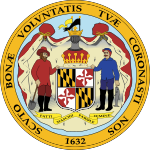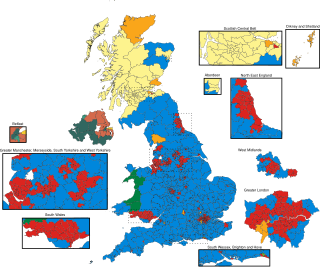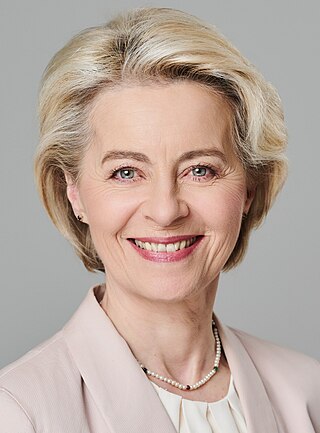| | ||||||||||||||||
| ||||||||||||||||
| ||||||||||||||||
| ||||||||||||||||
The 1975 Baltimore mayoral election saw the reelection of William Donald Schaefer.
| | ||||||||||||||||
| ||||||||||||||||
| ||||||||||||||||
| ||||||||||||||||
| Elections in Maryland |
|---|
 |
The 1975 Baltimore mayoral election saw the reelection of William Donald Schaefer.
| | This section is empty. You can help by adding to it. (May 2019) |
| | This section is empty. You can help by adding to it. (May 2019) |
The general election was held November 4. [1]
| Party | Candidate | Votes | % | |
|---|---|---|---|---|
| Democratic | William Donald Schaefer (incumbent) | 91,335 | 85.07% | |
| Republican | Claudette M. Chandler | 16,036 | 14.94% | |
| Total votes | 107,371 | |||
| Democratic hold | ||||

The 1997 United Kingdom general election was held on Thursday, 1 May 1997. The governing Conservative Party led by Prime Minister John Major was defeated in a landslide by the Labour Party led by Tony Blair, achieving a 179-seat majority and a total of 418 seats, the highest ever won by Labour.
The National Rally, known as the National Front from 1972 to 2018, is a French nationalist and right-wing populist party. It is the largest single parliamentary opposition group in the National Assembly. Its candidate was defeated in the second round in the 2002, 2017 and 2022 presidential elections. It opposes immigration, advocating significant cuts to legal immigration, protection of French identity, and stricter control of illegal immigration. It advocates for a 'more balanced' and 'independent' French foreign policy by opposing French military intervention in Africa and leaving NATO's integrated command. It supports reform of the European Union (EU) and its related organisations. It supports economic interventionism, protectionism, and zero tolerance of breaches of law and order.

The Indian National Congress (INC), colloquially the Congress Party or simply the Congress, is a political party in India with deep roots in most regions of India. Founded on 28 December 1885, it was the first modern nationalist movement to emerge in the British Empire in Asia and Africa. From the late 19th century, and especially after 1920, under the leadership of Mahatma Gandhi, the Congress became the principal leader of the Indian independence movement. The Congress led India to independence from the United Kingdom, and significantly influenced other anti-colonial nationalist movements in the British Empire.
The incumbent is the current holder of an office or position. In an election, the incumbent is the person holding or acting in the position that is up for election, regardless of whether they are seeking re-election.

The Telugu Desam Party is an Indian Telugu regionalist political party with influence in the states of Andhra Pradesh and Telangana. It was founded by the former chief minister of Andhra Pradesh N. T. Rama Rao (N.T.R.) on 29 March 1982 and has focused on supporting Telugu speakers. The party has won a five-time majority in the Andhra Pradesh Legislative Assembly and has emerged as the most successful political outfit in the state's history. It is currently the ruling party in the Andhra Pradesh Legislative Assembly.

The National Democratic Alliance is a centre-right to right-wing conservative Indian political alliance led by the right-wing Bharatiya Janata Party (BJP). It was founded on 15 May 1998 and currently controls the government of India as well as the government of 19 Indian states and one Union territory.

The 2010 United Kingdom general election was held on Thursday 6 May 2010, to elect Members of Parliament to the House of Commons. The election took place in 650 constituencies across the United Kingdom under the first-past-the-post system. The election resulted in a large swing to the Conservative Party similar to that seen in 1979, the last time a Conservative opposition had ousted a Labour government. The Labour Party lost the 66-seat majority it had previously enjoyed, but no party achieved the 326 seats needed for a majority. The Conservatives, led by David Cameron, won the most votes and seats, but still fell 20 seats short. This resulted in a hung parliament where no party was able to command a majority in the House of Commons. This was only the second general election since the Second World War to return a hung parliament, the first being the February 1974 election. This election marked the start of Conservative government for the next 14 years.
An independent, non-partisan politician or non-affiliated politician is a politician not affiliated with any political party or bureaucratic association. There are numerous reasons why someone may stand for office as an independent.

The Liberal Democrats are a political party in the United Kingdom, founded in 1988. The third-largest UK political party, they have 15 members of Parliament in the House of Commons, 84 members of the House of Lords, four Members of the Scottish Parliament, one member in the Welsh Senedd, and over 3,000 local council seats. The Liberal Democrat Conference formulates party policy.
The Labour Party is a political party in the United Kingdom that has been described as being an alliance of social democrats, democratic socialists and trade unionists. The Labour Party sits on the centre-left of the political spectrum. In all general elections since 1922, Labour has been either the governing party or the Official Opposition. There have been six Labour prime ministers and thirteen Labour ministries. Since the 2010 general election, it has been the second-largest UK political party by the number of votes cast, behind the Conservative Party and ahead of the Liberal Democrats. The party traditionally holds the annual Labour Party Conference during party conference season.

The 2016 United States presidential election was the 58th quadrennial presidential election, held on Tuesday, November 8, 2016. The Republican ticket, businessman Donald Trump and Indiana governor Mike Pence defeated the Democratic ticket of former secretary of state and First Lady of the United States Hillary Clinton and the junior senator from Virginia, Tim Kaine, in what was considered one of the biggest political upsets in American history. It was also the sixth presidential election in which both major party candidates were registered in the same home state; the others have been in 1860, 1904, 1920, 1940, and 1944.

General elections were held in India in seven phases from 11 April to 19 May 2019 to elect the members of the 17th Lok Sabha. Votes were counted and the result was declared on 23 May. Around 912 million people were eligible to vote, and voter turnout was over 67 per cent – the highest ever, as well as the highest ever participation by women voters until 2024 Indian general election.

The 2015 United Kingdom general election was held on Thursday 7 May 2015 to elect 650 Members of Parliament to the House of Commons. It was the only general election held under the rules of the Fixed-term Parliaments Act 2011 and was the last general election to be held before the United Kingdom would vote to end its membership of the European Union (EU). Local elections took place in most areas of England on the same day.

The 2017 United Kingdom general election was held on Thursday 8 June 2017, two years after the previous general election in 2015; it was the first since 1992 to be held on a day that did not coincide with any local elections. The governing Conservative Party remained the largest single party in the House of Commons but lost its small overall majority, resulting in the formation of a Conservative minority government with a confidence and supply agreement with the Democratic Unionist Party (DUP) of Northern Ireland.

The 2019 United Kingdom general election was held on Thursday 12 December 2019 with 47,567,752 registered voters entitled to vote to elect members of the House of Commons. The governing Conservative Party won a landslide victory with a majority of 80 seats, a net gain of 48, on 43.6% of the popular vote, the highest percentage for any party since the 1979 general election, though with a narrower popular vote margin than that achieved by Labour over the Conservatives in 1997. This was the second national election to be held in 2019 in the United Kingdom following the 2019 European Parliament elections.

The 2020 United States presidential election was the 59th quadrennial presidential election, held on Tuesday, November 3, 2020. The Democratic ticket of former vice president Joe Biden and the junior U.S. senator from California Kamala Harris defeated the incumbent Republican president, Donald Trump, and vice president, Mike Pence. The election took place against the backdrop of the global COVID-19 pandemic and related recession. The election saw the highest voter turnout by percentage since 1900, with each of the two main tickets receiving more than 74 million votes, surpassing Barack Obama's record of 69.5 million votes from 2008. Biden received more than 81 million votes, the most votes ever cast for a candidate in a U.S. presidential election.

The 2024 United States presidential election will be the 60th quadrennial presidential election, set to be held on Tuesday, November 5, 2024. Voters will elect a president and vice president for a term of four years. The incumbent president, Joe Biden, a member of the Democratic Party, is running for re-election. His predecessor, Donald Trump, a member of the Republican Party, is running for re-election for a second, non-consecutive term, after losing to Biden in the 2020 presidential election. If both are nominated, this will mark the first presidential election rematch since 1956.

The 2024 European Parliament election took place from 6 to 9 June. It was the tenth parliamentary election since the first direct elections in 1979, and the first European Parliament election after Brexit. In September 2023, the European Council increased the number of MEPs from 705 to 720.